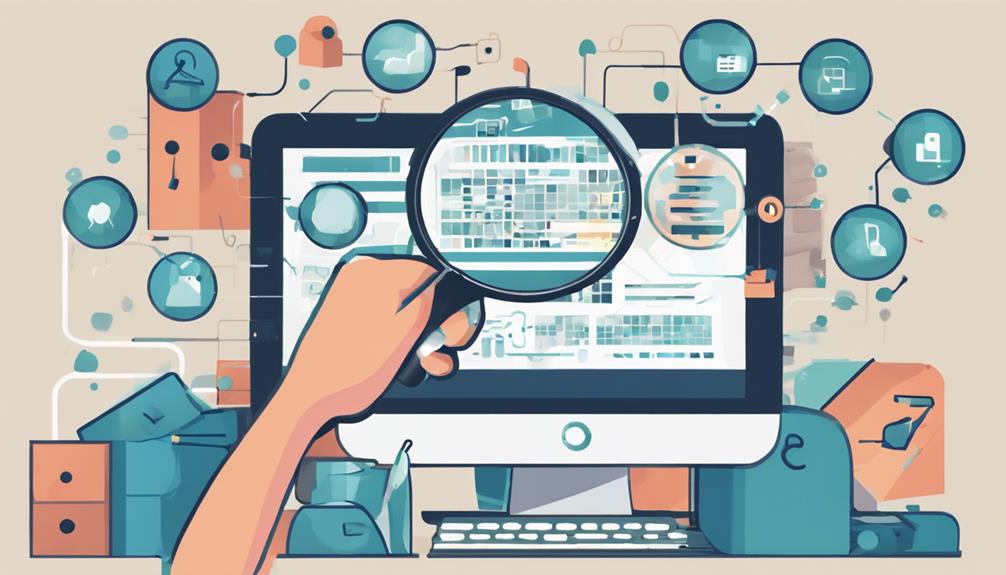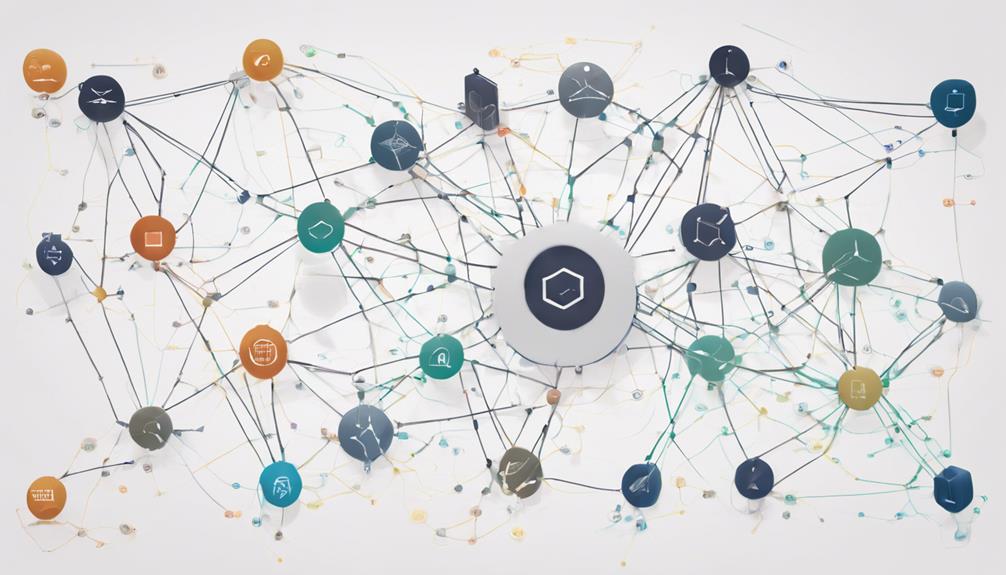When it comes to maintaining B2B data integrity, envision your business data as a delicate ecosystem that requires constant care and attention to thrive. By understanding the critical role data integrity plays in decision-making and operational efficiency, you set the stage for a discussion that will uncover essential strategies for safeguarding your data assets. From setting clear goals to implementing robust solutions and utilizing cutting-edge tools, the path to data integrity excellence is paved with proactive measures that promise to elevate your data quality standards.
Understand Data Integrity Importance
To effectively manage B2B data, understanding the importance of data integrity is paramount. Data accuracy is the foundation upon which all your B2B operations rely. Without accurate data, decision-making becomes compromised, leading to inefficiencies and potential losses. Ensuring data accuracy involves constant monitoring, validation, and cleansing processes to eliminate errors and inconsistencies. Trustworthiness assurance is another critical aspect of data integrity. When your data is trustworthy, stakeholders have confidence in its reliability, fostering stronger relationships and smoother business interactions. Implementing mechanisms to guarantee data trustworthiness, such as encryption protocols and access controls, is essential. By prioritizing data accuracy and trustworthiness assurance, you create a solid data integrity framework that forms the backbone of your B2B processes. Remember, accurate and trustworthy data not only enhances operational efficiency but also builds credibility and competitiveness in the business landscape.
Set Data Integrity Goals
To ensure the integrity of your B2B data, it is crucial to establish clear objectives and goals. Defining these targets will provide a roadmap for maintaining data quality and accuracy. By monitoring data on a regular basis, you can identify any discrepancies and take proactive steps to address them promptly.
Define Clear Objectives
Setting clear objectives is crucial when it comes to maintaining B2B data integrity. To ensure data accuracy and consistency, defining clear objectives is essential. Here’s how to set effective goals for data integrity:
- Specificity: Clearly outline what data accuracy and consistency mean for your organization. Define measurable targets for accuracy levels and consistency standards to provide a clear direction for data management efforts.
- Relevance: Align data integrity objectives with your business goals. Ensure that the accuracy and consistency of data directly contribute to achieving overall business objectives, such as improving decision-making processes or enhancing customer satisfaction.
- Timeliness: Establish timelines for achieving data accuracy and consistency goals. Set realistic deadlines for data quality improvements and regularly monitor progress to ensure timely completion and ongoing maintenance of high data integrity levels.
Monitor Data Quality
Regularly monitoring data quality is a fundamental aspect of maintaining B2B data integrity. Setting clear data integrity goals is crucial for effective monitoring. Data validation is a key component of monitoring data quality, ensuring that the information in your database is accurate, consistent, and up to date. By establishing data validation protocols, you can proactively identify and correct any errors or inconsistencies in your B2B data.
Error detection is another critical element of monitoring data quality. Implementing automated error detection processes can help you quickly identify any anomalies or discrepancies in your data. By regularly reviewing error reports and addressing any issues promptly, you can maintain the overall integrity of your B2B data.
Monitoring data quality should be an ongoing process within your organization. By continuously evaluating the accuracy and completeness of your data, you can ensure that your B2B data remains reliable and actionable for making informed business decisions.
Develop a Data Integrity Plan
To ensure robust data integrity, you should start by conducting a thorough data quality assessment. This step involves identifying any discrepancies or inaccuracies within your B2B database. Additionally, implementing compliance monitoring systems will help you track and maintain data integrity standards effectively.
Data Quality Assessment
When developing a robust data integrity plan for your B2B operations, one crucial aspect to consider is conducting a thorough Data Quality Assessment. This assessment involves evaluating the accuracy, completeness, and consistency of your data to ensure its reliability and usefulness in decision-making processes. Here are some key steps to include in your Data Quality Assessment:
- Utilize Data Cleansing Techniques: Implement automated tools and processes to detect and correct errors, inconsistencies, and duplicates in your B2B data. This includes removing outdated information and standardizing formats to enhance overall data quality.
- Employ Data Validation Methods: Establish validation rules to check data for accuracy and reliability. This involves verifying data against predefined criteria, such as format, range, and consistency, to ensure its integrity.
- Regularly Monitor Data Quality: Set up continuous monitoring processes to track the quality of your B2B data over time. This includes establishing metrics, implementing alerts for anomalies, and performing periodic audits to maintain data integrity.
Compliance Monitoring Systems
For effective management of data integrity in your B2B operations, implementing robust Compliance Monitoring Systems is essential. These systems play a critical role in ensuring that your data processes align with regulatory requirements and internal policies. Compliance audits are a key component of these systems, allowing you to assess whether your data practices adhere to established standards. By conducting regular compliance audits, you can identify any discrepancies or non-compliance issues promptly, enabling you to take corrective actions swiftly.
Moreover, Compliance Monitoring Systems facilitate data verification mechanisms, which are crucial for maintaining the accuracy and reliability of your B2B data. Through consistent data verification processes, you can confirm the correctness and completeness of your data, minimizing the risk of errors or inconsistencies. This proactive approach to data verification enhances the overall quality of your data assets and strengthens the foundation of your business operations. By integrating compliance audits and data verification into your Compliance Monitoring Systems, you can proactively safeguard the integrity of your B2B data.
Implement Data Integrity Solutions
To effectively implement data integrity solutions in your B2B operations, it is crucial to first assess your current data management processes and identify areas that require improvement. Implementing robust data validation measures and error prevention techniques is essential to ensure the accuracy and reliability of your business data. Here are three key steps to effectively enhance your data integrity:
- Automate Data Validation: Utilize automated tools to validate incoming data, ensuring it conforms to pre-defined standards and formats. This can help in detecting errors at an early stage and preventing inaccuracies from propagating throughout your systems.
- Establish Data Quality Checks: Implement regular data quality checks to identify discrepancies, outliers, or missing information. By setting up systematic checks, you can proactively address data inconsistencies and maintain a higher level of integrity.
- Enhance Data Governance Framework: Strengthen your data governance framework by defining clear roles and responsibilities for data management, establishing protocols for data access and usage, and enforcing data security measures. A well-structured governance framework can significantly improve data integrity by promoting accountability and transparency.
Use Data Integrity Tools
Regularly utilizing data integrity tools is paramount for maintaining the accuracy and reliability of your B2B data. Data validation tools help ensure that the information entered into your system meets specific criteria and is error-free. By setting validation rules, you can prevent incorrect or incomplete data from being stored in your database, enhancing the overall quality of your data.
Data cleansing tools play a crucial role in identifying and rectifying inconsistencies, duplicates, and inaccuracies within your B2B data. These tools help streamline your database by removing irrelevant or outdated information, thus improving the efficiency of your data management processes. By regularly cleansing your data, you can eliminate redundancies and ensure that your database remains up-to-date and reliable.
Integrating data integrity tools into your data management strategy is essential for maintaining the integrity of your B2B data. These tools not only enhance the quality of your data but also contribute to better decision-making and improved business outcomes.
Monitor Data Integrity Regularly
Transitioning from utilizing data integrity tools, monitoring data integrity regularly is a proactive approach that ensures the ongoing accuracy and consistency of your B2B data. Regular audits and data validation processes are crucial components of this monitoring strategy. Here’s how you can effectively monitor data integrity:
- Establish a Monitoring Schedule: Set specific intervals for conducting data integrity checks. Whether it’s weekly, monthly, or quarterly, consistency is key to identifying and addressing any discrepancies promptly.
- Utilize Automated Alerts: Implement automated systems that can alert you to any potential data integrity issues in real-time. This proactive approach allows you to address issues swiftly before they escalate.
- Document and Analyze Findings: Keep detailed records of your regular audits and validation results. Analyzing these findings over time can help you identify trends, root causes of data errors, and areas for improvement in your data management processes.
Frequently Asked Questions
How Do I Handle Data Breaches Affecting B2B Data Integrity?
To handle data breaches affecting B2B data integrity, prevent breaches by implementing robust security measures like encryption and access controls. If a breach occurs, swiftly assess and contain the situation, notify stakeholders, and work on restoring data integrity.
Can Data Integrity Be Maintained Without Dedicated Resources?
You cannot maintain data integrity effectively without dedicated resources. Data validation and automation, combined with regular audits and monitoring, are essential for ensuring accuracy and consistency in B2B data management. Allocate proper resources to safeguard your data integrity.
What Are the Consequences of Ignoring Data Integrity in B2B Relationships?
Ignoring data integrity in B2B relationships can lead to severe consequences. Do legal implications, damage to business reputation, trust issues, and potential financial loss sound like something you want to deal with? Prioritize data integrity!
How Can I Ensure Data Integrity When Working With Third-Party Vendors?
When working with third-party vendors, ensure data integrity by conducting vendor audits to verify compliance. Incorporate contractual obligations that outline data security measures and responsibilities. This strategic approach safeguards your B2B relationships and minimizes data risks.
What Steps Can Be Taken to Recover Data Integrity After a System Failure?
When data integrity falters post-system failure, focus on swift recovery. Implement best practices for data recovery, preventing future corruption. Your strategic approach will restore trust in your data’s reliability and fortify your systems against potential risks.



